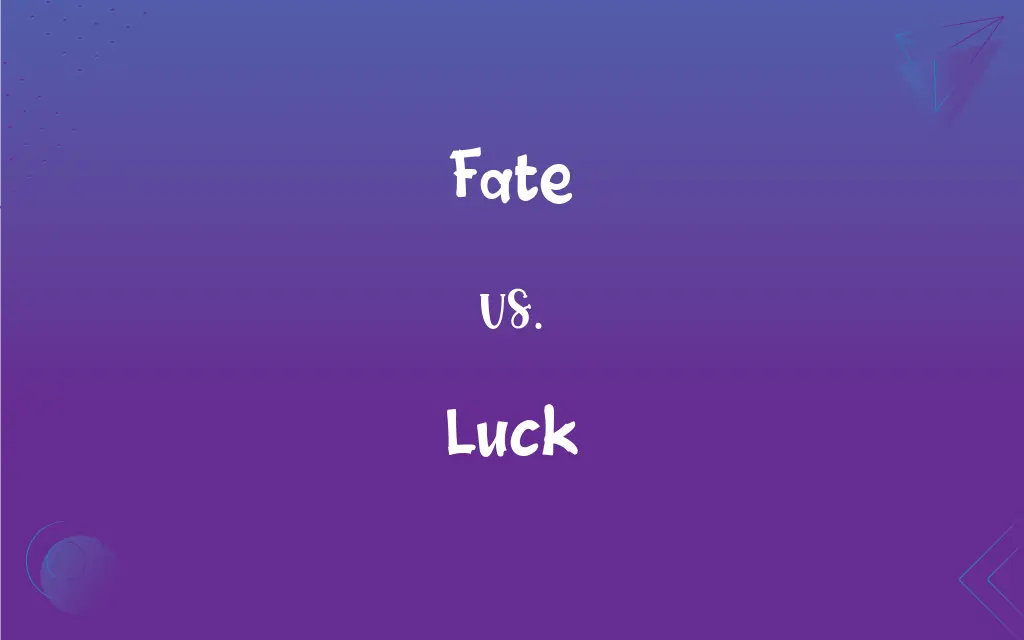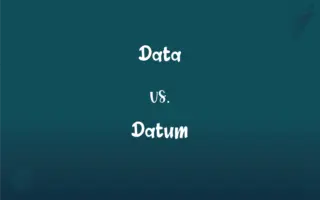Fate vs. Luck: What's the Difference?
Edited by Harlon Moss || By Janet White || Updated on September 23, 2023
Fate is the predetermined course of events; Luck is the chance occurrence of events in one’s favor or not.

Key Differences
Fate refers to the predetermined and inevitable sequence of events that are meant to happen in one's life. It is often considered unchangeable and is related to the philosophical or spiritual concept that there’s a natural order to the universe. Fate implies that events are preordained and will unfold regardless of one’s actions or efforts, reflecting a deterministic view of the universe. It’s an overarching concept, implying that individual destinies are woven into the fabric of existence.
Luck, on the other hand, is the concept of chance and probability, whereby the outcomes are uncertain and not predetermined. It is a spontaneous and unpredictable force that can work for or against an individual, depending on the circumstances. Luck does not imply any inherent order or predetermination in the universe; it is random and can be perceived as good or bad, depending on the perspective and the results of the chance occurrence.
Fate and Luck differ in the sense that fate is a constant, unalterable flow of events that are bound to happen, carrying an essence of destiny and purpose. Fate is immutable and is often perceived as a path that one is destined to walk, irrespective of one’s desires or actions. It represents a predetermined journey that an individual undergoes, interlinked with a greater cosmic plan.
In contrast, Luck is transient and fluctuating, with no predetermined path or cosmic linkage. It is not bound by destiny or any predetermined flow of events; it is arbitrary and can change instantaneously. The randomness and uncertainty associated with luck make it a fleeting and volatile concept, dependent on the spontaneity of the moment and the alignment of various factors and elements in time and space.
While Fate may often be perceived as carrying a deeper, philosophical, or spiritual undertone, suggesting a connection with the universe or a higher power, Luck is generally considered a secular concept, relying on chance and randomness, without attributing the events to any higher order or divine intervention. The contrast between the deterministic nature of Fate and the randomness of Luck highlights the diverging philosophical perspectives on life, existence, and the universe.
ADVERTISEMENT
Comparison Chart
Nature
Predetermined and inevitable.
Random and by chance.
Alterability
Considered unalterable.
Variable and can change.
Perceived Control
Believed to be beyond human control.
Can be influenced by actions to some extent.
Philosophical Undertone
Often linked to destiny and cosmic order.
Generally considered a secular concept.
Positivity/Negativity
Neutral—can be positive or negative.
Can be good or bad depending on the outcome.
ADVERTISEMENT
Fate and Luck Definitions
Fate
The development of events beyond a person's control.
His fate was sealed when he made the decision to defy the king.
Luck
Fortunate happenings; favoring chance.
The team had luck on their side and won the match.
Fate
A predetermined course of events often linked to destiny.
The prophecy foretold the hero's fate to save the kingdom.
Luck
The success or failure apparently brought by chance.
Winning the lottery was sheer luck.
Fate
The supposed force, principle, or power that predetermines events
Fate did not favor his career.
Luck
The events or circumstances that operate by chance.
With a bit of luck, we'll arrive on time.
Fate
The inevitable events predestined by this force
It was her fate to marry a lout.
Luck
An unknown and unpredictable phenomenon causing an event to result one way rather than another.
It must have been pure luck that he escaped without injury.
Fate
A final result or consequence; an outcome
What was the fate of your project?.
Luck
The chance happening of fortunate or adverse events; fortune
They met one day out of pure luck.
Fate
An unfavorable outcome in life; doom or death
Suffered a fate worse than death.
The island where the explorer met his fate.
Luck
Good fortune or prosperity; success
We wish you luck.
Fate
Fates Greek & Roman Mythology The three goddesses, Clotho, Lachesis, and Atropos, who control human destiny. Used with the.
Luck
One's personal fate or lot
It was just my luck to win a trip I couldn't take.
Fate
The presumed cause, force, principle, or divine will that predetermines events.
Luck
To gain success or something desirable by chance
Lucked into a good apartment.
Lucked out in finding that rare book.
Fate
The effect, consequence, outcome, or inevitable events predetermined by this cause.
Luck
Something that happens to someone by chance, a chance occurrence, especially a favourable one.
The raffle is just a matter of luck.
Sometimes it takes a bit of luck to get success.
I couldn't believe my luck when I found a fifty dollar bill on the street.
Gilbert had some bad luck yesterday — he got pick-pocketed and lost fifty dollars.
Fate
An event or a situation which is inevitable in the fullness of time.
Luck
A superstitious feeling that brings fortune or success.
He blew on the dice for luck.
I wish you lots of luck for the exam tomorrow.
Fate
Destiny; often with a connotation of death, ruin, misfortune, etc.
Accept your fate.
Luck
Success.
I tried for ages to find a pair of blue suede shoes, but didn't have any luck.
He has a lot of luck with the ladies, perhaps it is because of his new motorbike.
Fate
(mythology) Fate (one of the goddesses said to control the destiny of human beings).
Luck
The results of a random number generator.
Fate
(biochemistry) The products of a chemical reaction in their final form in the biosphere.
Luck
To find something through good fortune; used with into, on, onto or upon.
Fate
(embryology) The mature endpoint of a region, group of cells or individual cell in an embryo, including all changes leading to that mature endpoint
Luck
That which happens to a person; an event, good or ill, affecting one's interests or happiness, and which is deemed casual; a course or series of such events regarded as occurring by chance; chance; hap; fate; fortune; often, one's habitual or characteristic fortune; as, good, bad, ill, or hard luck. Luck is often used by itself to mean good luck; as, luck is better than skill; a stroke of luck.
If thou dost play with him at any game,Thou art sure to lose; and of that natural luck,He beats thee 'gainst the odds.
Fate
(transitive) To foreordain or predetermine, to make inevitable.
The oracle's prediction fated Oedipus to kill his father; not all his striving could change what would occur.
Luck
Your overall circumstances or condition in life (including everything that happens to you);
Whatever my fortune may be
Deserved a better fate
Has a happy lot
The luck of the Irish
A victim of circumstances
Success that was her portion
Fate
A fixed decree by which the order of things is prescribed; the immutable law of the universe; inevitable necessity; the force by which all existence is determined and conditioned.
Necessity and chanceApproach not me; and what I will is fate.
Beyond and above the Olympian gods lay the silent, brooding, everlasting fate of which victim and tyrant were alike the instruments.
Luck
An unknown and unpredictable phenomenon that causes an event to result one way rather than another;
Bad luck caused his downfall
We ran into each other by pure chance
Fate
Appointed lot; allotted life; arranged or predetermined event; destiny; especially, the final lot; doom; ruin; death.
The great, th'important day, big with the fateOf Cato and of Rome.
Our wills and fates do so contrary runThat our devices still are overthrown.
The whizzing arrow sings,And bears thy fate, Antinous, on its wings.
Luck
An unknown and unpredictable phenomenon that leads to a favorable outcome;
It was my good luck to be there
They say luck is a lady
It was as if fortune guided his hand
Fate
The element of chance in the affairs of life; the unforeseen and unestimated conitions considered as a force shaping events; fortune; esp., opposing circumstances against which it is useless to struggle; as, fate was, or the fates were, against him.
A brave man struggling in the storms of fate.
Sometimes an hour of Fate's serenest weather strikes through our changeful sky its coming beams.
Luck
A force that brings good fortune or adversity.
He attributed his success to hard work and a little bit of luck.
Fate
The three goddesses, Clotho, Lachesis, and Atropos, sometimes called the Destinies, or Parcæwho were supposed to determine the course of human life. They are represented, one as holding the distaff, a second as spinning, and the third as cutting off the thread.
Fate
An event (or a course of events) that will inevitably happen in the future
Fate
The ultimate agency that predetermines the course of events (often personified as a woman);
We are helpless in the face of Destiny
Fate
Your overall circumstances or condition in life (including everything that happens to you);
Whatever my fortune may be
Deserved a better fate
Has a happy lot
The luck of the Irish
A victim of circumstances
Success that was her portion
Fate
Decree or designate beforehand;
She was destined to become a great pianist
Fate
The ultimate outcome or resolution of one’s life or a particular situation.
The warrior accepted his fate with grace and dignity.
Fate
The inevitable events preordained by a supernatural power.
Many believe that fate is written by the gods and unchangeable.
Fate
The destined end or consequence for a person or thing.
It was her fate to live a life of solitude.
FAQs
Is fate related to destiny?
Yes, fate is often synonymous with destiny, referring to a predetermined set of events.
Is fate always predetermined?
Yes, fate is typically considered as predetermined and unalterable.
Can luck be controlled or increased?
Luck is generally viewed as random, but some believe that actions or “luck-enhancing” items can influence it.
Can actions and decisions influence luck?
Some believe actions and decisions can align conditions favorably, potentially influencing luck.
Is luck always positive?
No, luck can be good or bad, affecting individuals positively or negatively.
Does fate imply a lack of free will?
The concept of fate often contrasts with free will, suggesting events are predetermined and inevitable.
Can luck change instantaneously?
Yes, luck is variable and can change spontaneously.
Is everyone subjected to fate?
The belief in fate varies, but those who believe in it typically see everyone as subjected to it.
Does fate have a moral component?
Some see fate as neutral, while others believe it can be a result of moral destiny or karma.
Is there scientific evidence for luck?
Luck is not scientifically quantifiable; it’s a concept to describe chance occurrences.
Is relying on luck a sound strategy?
Relying solely on luck is generally not considered a reliable or sustainable strategy.
Can beliefs in fate be harmful?
Rigid beliefs in fate can potentially lead to fatalism and passivity.
Can fate be changed with actions?
The concept of fate suggests it is unchangeable, irrespective of actions.
Is luck the same as probability?
Luck involves probability, but they are not synonymous; luck is a perception of how probability favors an outcome.
Can a belief in fate affect one’s mindset?
Yes, believing in fate can impact mindset, potentially leading to either resignation or acceptance.
About Author
Written by
Janet WhiteJanet White has been an esteemed writer and blogger for Difference Wiki. Holding a Master's degree in Science and Medical Journalism from the prestigious Boston University, she has consistently demonstrated her expertise and passion for her field. When she's not immersed in her work, Janet relishes her time exercising, delving into a good book, and cherishing moments with friends and family.
Edited by
Harlon MossHarlon is a seasoned quality moderator and accomplished content writer for Difference Wiki. An alumnus of the prestigious University of California, he earned his degree in Computer Science. Leveraging his academic background, Harlon brings a meticulous and informed perspective to his work, ensuring content accuracy and excellence.































































